Introduction
In the complex world of business, protecting your assets and ensuring the longevity of your enterprise is paramount. One of the critical ways to achieve this is through general liability insurance. This type of insurance is designed to safeguard businesses from a variety of claims that can arise from day-to-day operations. In this blog, we will delve into five essential aspects of general liability insurance: its coverage scope, its importance for businesses, the limitations it carries, its legal implications, and the factors affecting its cost. By the end of this blog, you’ll have a clear understanding of why general liability insurance is a crucial component of any business’s risk management strategy.
Coverage Scope
General liability insurance offers broad protection against numerous claims arising from business activities. This insurance policy typically covers bodily injury, property damage, personal injury, and other forms of liability that might occur on the business premises or as a result of the business’s activities offsite. “For instance, if a customer slips and falls in your store, general liability insurance can cover medical expenses and legal fees if the customer decides to sue,” explains Jane Smith, a risk management consultant. Similarly, if your business activities cause damage to a client’s property, this insurance can cover the cost of repairs or replacements. By providing this extensive coverage, general liability insurance helps businesses manage the financial risks associated with unexpected incidents.
Importance for Businesses
General liability insurance is not just a safety net but a critical component of a business’s overall risk management strategy. For businesses of all sizes, this insurance helps mitigate the financial risks of lawsuits and claims. “Without general liability insurance, businesses might face substantial out-of-pocket expenses for legal fees, settlements, or judgments, which can be financially devastating,” warns the National Federation of Independent Business (NFIB). For small businesses, a single lawsuit can mean the difference between staying afloat and closing down. With general liability insurance, companies can operate with peace of mind, knowing their business can avoid unforeseen liabilities that could otherwise jeopardize their financial stability.
Not All-Inclusive
While general liability insurance covers many claims, it is not all-encompassing. Businesses must understand what this insurance does not cover to ensure they are fully protected. According to the U.S. Small Business Administration, general liability insurance typically does not include coverage for professional errors and omissions, workers’ compensation, or claims related to cyber incidents. Professional errors and omissions insurance (or professional liability insurance) is necessary for businesses that provide professional services or advice. Workers’ compensation insurance is required to cover employee injuries that occur on the job. Cyber insurance is becoming increasingly essential to protect against data breaches and other cyber threats. Therefore, businesses often need additional, specialized insurance policies to cover these risks.
Legal Requirement
In many jurisdictions, general liability insurance is not mandatory for state and local entities. However, securing contracts, leases, or licenses is often a prerequisite. “Many clients and partners may require proof of general liability insurance before agreeing to work with a business,” notes the Insurance Journal. For example, if you run a construction company, a client might insist on seeing your general liability insurance certificate before hiring you for a project. Similarly, landlords may require tenants to have general liability insurance as a condition for leasing commercial space. Even when it is not mandated by law, having general liability insurance can enhance a business’s credibility and demonstrate its commitment to risk management and financial responsibility.
Cost Factors
The cost of general liability insurance can vary widely based on several factors. The type of business, its size, location, and the amount of coverage needed all play a role in determining premiums. Higher-risk industries like construction or manufacturing typically face higher premiums than lower-risk sectors like consulting or retail. “For instance, a construction company might pay more for general liability insurance due to the higher likelihood of accidents and property damage,” says the Insurance Information Institute report. On the other hand, a consulting firm may enjoy lower premiums due to the lower risk associated with its operations. Additionally, the location of the business can impact insurance costs, as areas with higher litigation rates or more stringent regulatory requirements may result in higher premiums. By understanding these cost factors, companies can make informed decisions when selecting the appropriate level of coverage.
Conclusion
General liability insurance is essential for businesses seeking to protect themselves from various claims arising from their operations. Companies can make informed decisions about their insurance needs by understanding its coverage scope, recognizing its importance, being aware of its limitations, knowing its legal implications, and considering the factors that affect its cost. While general liability insurance may not cover every risk, it provides a strong foundation for a comprehensive risk management strategy. Business owners must understand that general liability insurance primarily covers damage to other people’s property or bodily injury, not damage to the company’s property or personnel. This type of coverage is through a Business Owner’s Policy (BOP) or separately in a monoline property policy. Coverage for injuries to owners or personnel is through a Worker’s Compensation Policy.
“When in doubt, one can always contact a trusted insurance professional to see if there may be other protection gaps,” advises insurance broker Emily Johnson. When a business works with a professional who knows what questions to ask an owner, it can be the greatest asset in securing the appropriate insurance coverage. So take ease, focus the energy on securing new contracts, and let the insurance company protect the assets you already have or will soon acquire.
